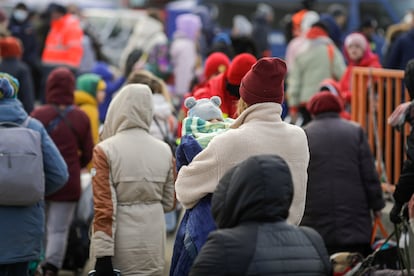Zelenskiy sets up Ministry of Unity to save Ukraine from demographic disaster
Kyiv is promoting new emergency measures to ensure the return of millions of citizens who have left the country due to the Russian invasion

Ukraine’s demographic hemorrhage is threatening the country’s future as much as the Russian army. According to the United Nations, 6.7 million Ukrainians live abroad as refugees and the country lost 400,000 inhabitants in the first half of this year alone, according to statistics from the National Bank of Ukraine. In the same period in 2023, the population fell by 231,000 people.
Ukraine is on its way to becoming like Ireland, National Security Council Secretary Oleksandr Litvinenko said in August: a country with fewer native people living in it than overseas. Post-war reconstruction will require the return, or at least the involvement, of many of those refugees. To this end, President Volodymyr Zelenskiy intends to create a new government ministry to maintain the link between the homeland and the diaspora.
The Ukrainian Foreign Ministry was tasked with designing the new government agency last June. It was the president himself who confirmed on August 20 at a meeting with diplomats that the mission was to establish a new ministry. Zelenskiy explained that the full name would be the Ministry of Ukrainian Unity and Countering Russian Influence on Ukrainians.
The goal is twofold, Zelenskiy said: “The Ukrainian state must be the real center for the current global Ukrainian nation.” He also said the other priority will be to rid millions of fellow citizens abroad of Russian influence: “We all see Russia using a massive propaganda resource abroad, especially targeting Ukrainians. We see how many aspects of the spiritual independence of our people are not settled and how Russia is using its own church structures for agent work and spreading discord,” he added, pointing to institutions such as the Russian Orthodox Church.
On August 27, Zelenskiy said that the new ministry should come into force this autumn and that it should coordinate efforts to return more than 7.5 million Ukrainians to their homeland. The Ministry of Economy estimates that 4.5 million Ukrainians need to be brought back to rebuild the country. The Center for Economic Strategy, a Ukrainian economic analysis institution, estimates that between 30% and 60% of refugees could return to Ukraine after the war, depending on the living conditions they may find there.
Ukrainian media outlet Hromadske reported on October 8, citing sources from Zelenskiy’s political party, Servant of the People, which holds an absolute majority in parliament, that the formation of the new ministry has been delayed due to the selection of a person to head it and the budget it will be allocated. In all likelihood, these sources say, the Ministry of Unity will have to operate mainly with contributions from foreign governments.
On October 2, the Ukrainian Cabinet of Ministers approved the so-called Strategy for Demographic Development. One of the challenges that the government has set itself is the repatriation of five million Ukrainians. This plan does not include the more than one million Ukrainian nationals who have resided in Russia since the beginning of the invasion. The National Academy of Sciences also made public its predictions of population decline in Ukraine: if there are currently 35.8 million inhabitants in the entire country (31 million in the territories of unoccupied Ukraine), by 2041 it is estimated that there will be 28 million and by 2051, only 25 million. Ukraine had a population of 48 million people 20 years ago. Since it gained independence in 1991, Ukraine has become a country of emigration, like the rest of the states born in the wake of the collapse of the Soviet Union.
Ukraine has repeatedly asked the EU what legal options there are for repatriating its citizens. Brussels has responded that no one can be forced to leave the EU if they are legally entitled to live in the bloc, and especially if they have special protection. The pressure has been focused mainly on men of military age: according to data from the European Statistical Office, 1.5 million Ukrainian men aged 18 to 64 reside in the EU as refugees. At a political conference in Kyiv in September, Polish Foreign Minister Radoslaw Sikorski proposed turning off the tap on special subsidies for Ukrainian refugees, citing Germany and the Netherlands in particular. His Ukrainian counterpart Andrii Sibiga, who was also taking part in the conference, agreed. “It is time to raise the issue of return programs for Ukrainians with the EU. Of course, appropriate conditions must be created,” Sibiga said.
Political division
How to deal with the diaspora is a highly tense political issue in Ukraine. This was made clear at a debate organized by the Kyiv Press Centre on 12 September, where representatives of several parties discussed the upcoming law that would allow Ukrainians to hold dual citizenship. In Ukraine, it is currently illegal to have multiple nationalities. “Multiple citizenship is critical to not losing these millions who have left,” said Paul Grod, president of the World Ukrainian Congress, an organization that claims to represent more than 20 million people of Ukrainian descent worldwide. “We cannot push people living abroad to have to choose. Because if they live in the United States or Germany, they will choose these nationalities,” Grod stressed.
Meanwhile, time is running against Ukraine’s interests, as Holos MP Solomiia Bobrovska admitted: “The generation that has now left Ukraine, unlike the previous ones, is assimilating more quickly in the host country.” Millions of Ukrainians, especially young women, have started a new life with children who have already been in school in other countries for nearly three years.
More radical voices are also adding fuel to the fire. Dmitry Korchinsky, founder of the far-right Brotherhood party, has sparked a bitter controversy by defending the need to ban minors from leaving Ukraine in order to save the country: “The mothers of these children want to take advantage of the wonderful opportunity given to them by the [Russian] invasion to receive benefits in European countries,” Korchinsky said Wednesday in the Telegraf newspaper: “The nation is losing huge numbers of children who will not return and who will not grow up as Ukrainians.”
There are also calls within the Ukrainian Armed Forces for lowering the age of military conscription to under 25, which many analysts warn would lead to even more young people leaving the country. In a rare public appearance, Valerii Zaluzhnyi, former commander-in-chief of the Ukrainian army and now ambassador to London, said at a conference on October 3 that he had always opposed this despite the pressure he was put under: “We need Ukraine to exist in 20 to 30 years. These people aged between 18 and 25 are the ones who will save our country.”
Sign up for our weekly newsletter to get more English-language news coverage from EL PAÍS USA Edition
Tu suscripción se está usando en otro dispositivo
¿Quieres añadir otro usuario a tu suscripción?
Si continúas leyendo en este dispositivo, no se podrá leer en el otro.
FlechaTu suscripción se está usando en otro dispositivo y solo puedes acceder a EL PAÍS desde un dispositivo a la vez.
Si quieres compartir tu cuenta, cambia tu suscripción a la modalidad Premium, así podrás añadir otro usuario. Cada uno accederá con su propia cuenta de email, lo que os permitirá personalizar vuestra experiencia en EL PAÍS.
¿Tienes una suscripción de empresa? Accede aquí para contratar más cuentas.
En el caso de no saber quién está usando tu cuenta, te recomendamos cambiar tu contraseña aquí.
Si decides continuar compartiendo tu cuenta, este mensaje se mostrará en tu dispositivo y en el de la otra persona que está usando tu cuenta de forma indefinida, afectando a tu experiencia de lectura. Puedes consultar aquí los términos y condiciones de la suscripción digital.









































